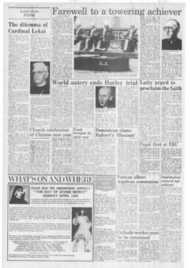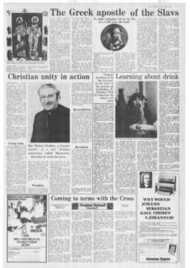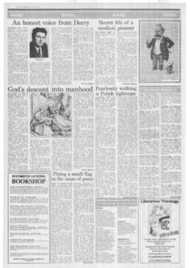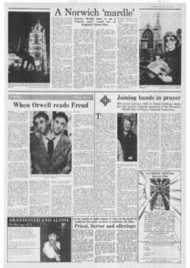Page 5, 1st March 1985
Page 5
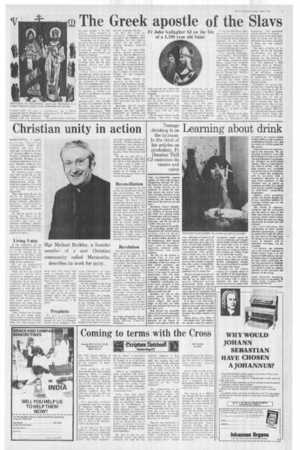
Report an error
Noticed an error on this page?If you've noticed an error in this article please click here to report it.
Tags
Share
Related articles
Ss Cyril And Methodius
Church Honours Two Patron Saints Of Europe
Kalendar Of The Week
London Slavs Honour Their Patron Saints High Mass At St....
Jugoslavia Has A Problem
ca The Greek apostle of the Slays
Fr John Gallagher SJ on the life of a 1,100 year old Saint
the great apostles of the Slav nations. Their memory is reverred especially by the Czechs and Croats, Serbs and Bulgars.
Methodius was a pioneer in the use of the vernacular in the liturgy. He was also well ahead of his time in preaching ecumenism. Today he is vererated by both Eastern and Western Christians.
The Slav people are indebted to him not only for their Christian faith, but for their general culture and their political and national advancement.
They were born in Thessalonica, which lies on the beautiful gulf of the Aegean sea between the Greek.mainland and the peninsula of Chalcidice. Both were ordained priests, then went to Constantinople where Cyril (called Constantine before he became a monk) was professor and librarian at Santa Sophia university.
Methodius was an administrator and became governor of a province. In 863 Rostivlav, the local ruler in Moravia invited them to come as Christian missionaries. Their deep knowledge of the Slavonic language was a great asset, They translated scripture and liturgy into the vernacular Slavonic.
So that this could be universally understood they invented a new alphabet called Glagolithic. Not only religious writings but the whole of Slavonic literature benefited from this.
But they ran into deep trouble. German missionaries who had been in Moravia for some time strongly opposed them. They greatly resented the use of the vernacular in the liturgy. They accused Methodius of heterodoxy and reported him to Rome. In 869, Methodius went to Rome to answer these charges. He was completely exonerated.
Pope Adrian showed his approval of the work by consecrating Methodius bishop. On his return, however, he had to face greater opposition. The Germans even managed to get him sentenced to prison. Methodius suffered this for two years, then the new Pope John VIII intervened and had him released.
Methodius had the people behind him. He spoke their language, and they especially appreciated his teaching and liturgy. He developed educational work for the young. They received basic instruction in reading and writing their own language.
He had special groups studying for the priesthood. It was not only book work, He instructed, for instance, the Macedonians on the best Way to graft fruit trees. Up to that time their crops had not been plentiful.
But his special interest was his seminary. The native clergy would ultimately use the Slavonic liturgy for public worship. The mass of people, hearing the Christian truths expressed in their own language, eagerly accepted them.
After only 'a few years, Methodius was able to take a number of seminarists to Rome for ordination. The Slavonic liturgy has withstood the passage of time. Today it is the spiritual heritage of countless Slays.
All this was Metinadinc,, idea, but he did it with permission of the ecclesiastical authorities. His work had been blessed from the beginning by the Byzantine emperor and by the Patriarch of Constantinople. Today well over a hundred million Slays use the Byzantine-Slavonic liturgy.
They include Russians, Ukrainians, Ruthenians, Bulgarians, Serbs. But along with success opposition grew. Many coqld not stomach Methodius's Slavonic liturgy. "Only three languages are proper and fitting for liturgical service," he was told, "Hebrew, Greek and Latin."
Throughout the West it was believed that these three languages were considered liturgical because they were used by Pilate for inscription on the Cross. People who held this view were called tri-lingualists.
In reply, Methodius asked them how could they understand 'what was said if they did not understand the language. Yet "every tongue must confess Jesus Christ as the Lord, dwelling in the glory of God the Father".
In 879, Methodius was again called to Rome to answer charges of disobedience and
heterodoxy. The accusation centred around the Filioque — the procession of the Holy Spirit from the Father and the Son. Met hodius was closely examined in Rome and was solemnly vindicated.
The main objection of his enemies, led by the Bavarian missionaries, was not the solution of a theological problem, but the removal of Methodius from Moravia. Pope John VIII addressed a Bull Industriae Tuae to Moravia. Part of it deals with Methodius under three points — assurance of his orthodoxy, renewed confirmation of his appointment as archbishop of Moravia, renewed approval of the Slavonic liturgy.
Methodius was getting old. He had had a tough life and the strain was beginning to tell. He took part in the Palm Sunday ceremonies in the year 8R5. A few days later he died at Veiehrad in Czechoslovakia. The people showed their love for their great leader. The cult was spontaneous and widespread. Countless multitudes filed into the cathedral and prayed round the dead prelate. Today. his memory is revered by the Slav peoples.
blog comments powered by Disqus



